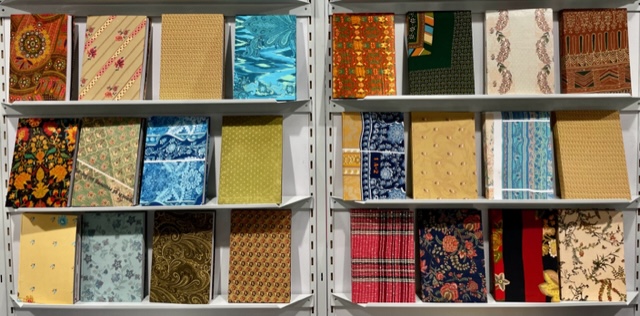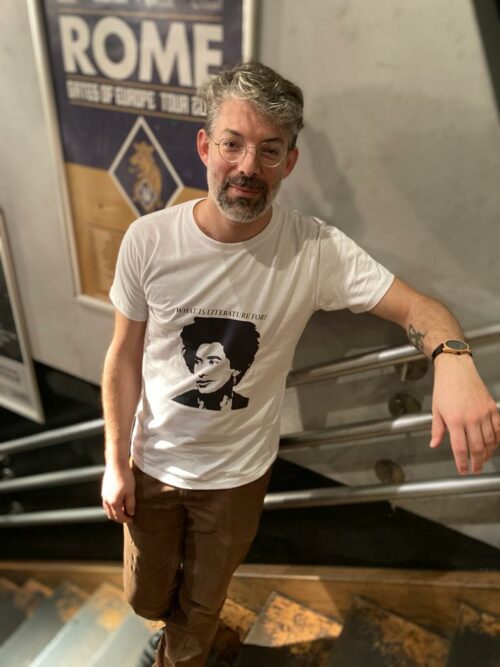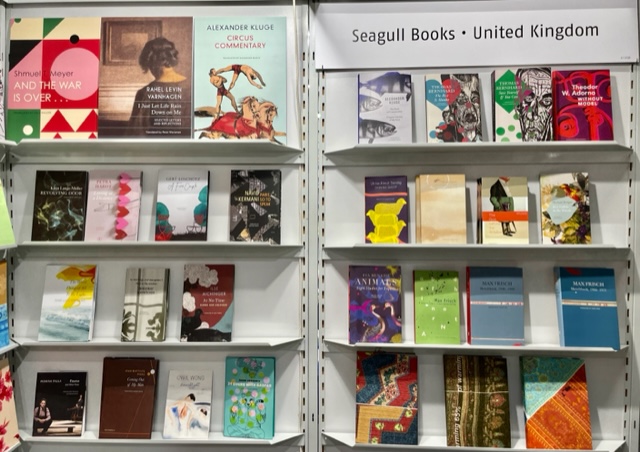
By Katy Derbyshire
I haven’t done a write-up of the Frankfurt Book Fair for a few years, and this time was a little different; after two significantly smaller fairs dominated by Covid, this year’s was bigger and very much about the Arab-Israeli conflict. Amid the horror and helplessness over events in Israel and Palestine, focusing on the Book Fair’s reaction to the conflict felt more manageable than staring into the abyss of heartbreaking violence as a whole. For all our faith in the power of literature, there is realistically very little that even the world’s largest meeting of publishing people can do to end terrorism and bombardments on the ground.
And so there was a lot of talk about the Palestinian author Adania Shibli’s effective disinvitation by the book fair – or was it by Litprom, which is chaired by the boss of the book fair? The general consensus among people I spoke to was that an individual writer – especially one based in Berlin – should not be punished for Hamas’ actions. A number of writers cancelled their own participation in reaction to a perceived silencing of Palestinian voices; some of those who attended wore T-shirts featuring Shibli’s face and the words WHAT IS LITERATURE FOR? I thought cancelling Shibli’s award ceremony was a pointless and unfair gesture, and PEN Berlin thought the same and instead held a joint reading from her novel, translated into German by Günther Orth.

What else happened? The German Book Prize went to the Austrian writer Tonio Schachinger for Echtzeitalter, taking a lot of people by surprise. Including me; having listened to a recording of the book’s launch, I now know it’s about a boy at a Viennese private school and the computer game Age of Empires 2. What with Schachinger’s previous novel zooming in on a professional footballer, I’m pretty sure his and my interests don’t overlap much. And then he went and said in an interview with Der Standard that asking him why he’d switched from an independent Austrian publisher to a big German one was like asking a footballer why he’d transferred from Admira to Real Madrid (I assume this means more to football fans than to me):
“It’s not just about financial clout, it’s also a question of quality. The best editors work for the best publishing houses. There’s not one single argument for making that decision differently if you get the chance.”
Which, as you can imagine, upset a few people.
***
My personal book fair? I had some great meetings with other translators and publishing people. I talked books and literary gossip and hairstyles and class consciousness with far-flung friends and new acquaintances. I was relieved to find that after a few years’ absence, the faces in the international publishing community have aged as visibly as I have. I absolutely judged entire publishing empires on how their editors treated little translator me. I stayed well away from the schmoozing, wheeling and dealing over extortionate drinks at the Frankfurter Hof hotel.
And I visited my pals from Seagull Books, whose German and Swiss lists are looking pretty amazing. They have a lot of heavy-hitting dudes but also work by Eva Menasse, Ulrike Almut Sandig, Judith Kuckart and Katja Lange-Müller. The India and UK-based publishing house produces a lavishly bound catalogue every year featuring original writing commissioned and translated just for that purpose; this year’s uses offcuts from a dressmaker that would otherwise have been thrown away. Editor, designer and all-round lovely person Sunandini Banerjee’s digital collages round it all off; I have a special shelf dedicated to my growing collection of these things of beauty. This year, it took a couple of Kolkatans to point me in the direction of the poet Durs Grünbein’s wife’s whisky and cigar shop, walking distance from my house.


I also went to three parties, one per night: Fischer Verlag’s utterly heaving reception for the international crowd, where I huddled in a corner chatting to other UK translators, followed by a ride home on a Vespa. The helmet may have crushed my hairstyle, but the thrill of leaning into the corners while tipsy on free wine was definitely worth it. Next up was a little drinks party for the fab new German literary mag Delfi, attended only by the coolest of kids (and me and my pals) in a tiny space plus the pavement outside, accessed via Frankfurt’s scariest street. Drunken ideas for saving the world are some of the best ideas for saving the world, I learned.
And then there was the Voland & Quist party, fast becoming the place to be if you like to dance and don’t mind paying for your own drinks. I got to do a shift on the door, where our fantastic bouncer Teddy persuaded people to smile while they blagged their way in. This may or may not be the way the Berghain door works; I wouldn’t know. I was confused, by the way, when an American publisher informed me that Berghain was the only place to dance in Berlin. What about all the scuzzy venues I’ve been frequenting for the past three decades?
Sadly, the German literary community once again failed to wear anything brighter than navy blue, leaving me to stand out like a sore thumb in my 70s-style-Dolly-Parton-with-political-opinions outfit. Surely, dear German literary community, a time must come when you too don bright shades of polyester mix and live a little, sartorially. I shall continue to set a good example – and I expect you to buck up your wardrobe act next year. Exhausted and offended by other people not being exactly the same as me, I left at about 2 am before my misanthropist streak really kicked in.
Next year, I hope my facial recognition skills magically improve and I spend less time pretending to know who people are. And I hope we have peace.
